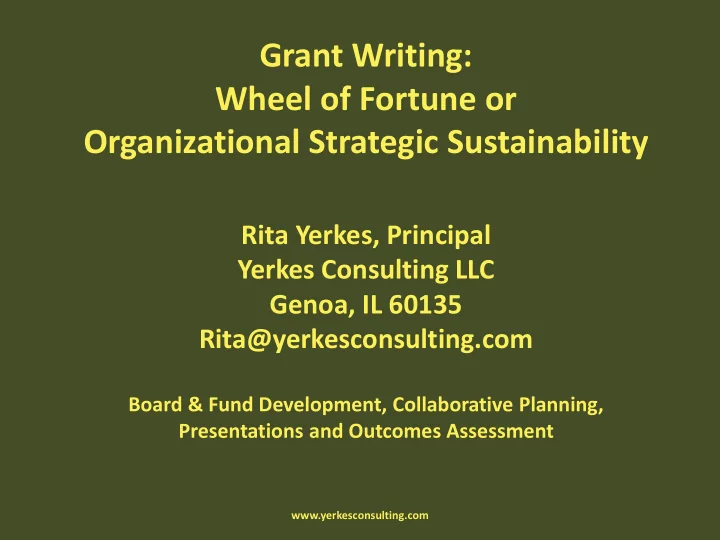

Grant Writing: Wheel of Fortune or Organizational Strategic Sustainability Rita Yerkes, Principal Yerkes Consulting LLC Genoa, IL 60135 Rita@yerkesconsulting.com Board & Fund Development, Collaborative Planning, Presentations and Outcomes Assessment www.yerkesconsulting.com
Your Goals for this Afternoon www.yerkesconsulting.com
Projected Giving 2017 The Philanthropy Outlook 2016 & 2017
Grant Ready Quiz "You never get a second chance to make a good first impression." -- Will Rogers www.yerkesconsulting.com
Where To Start Conceive the project Get award Find a & grant Implement Submit Write proposal proposal www.yerkesconsulting.com
Where To Start • Understand Grant • Research Funders Writing – Read RFPs – Talk to Colleagues – Read Websites – Read Grant Writing – Read Award Profiles Guides – Talk to Program Manager ** – Read Funded & – How does your Unfunded Proposals organization’s mission fit the mission of funders
Tell A Good Story • “Good grant writing is good storytelling” • “If it doesn’t make sense; it’s not true!”
Prospectus • Write a Prospectus – What is your idea? – What is your project? – Why is it needed? Unique? – Who will it affect? – Where & When will it take place? – Who are the experts? How will they add value? – How much money do you need? What will it pay for?
Funder Grantee Lists & Profiles • Study trends & patterns. • Priority areas • Scope • Average award size • Allowable & unallowable activities, costs
Finding Funders & Grantee Lists • Government Grants – www.grants.gov • The Foundation Center – www.foundationcenter.org • GrantsWeb – www.srainternational.org/sra03/grantsweb/ind ex.cfm • Charitable Giving - http://nccs.urban.org/data- statistics/charitable-giving-america-some-facts- and-figures
An Effective Proposal • Aligns with vision & • Compelling specific mission of sponsor problem • Speaks to the • Interesting approach requirements • Skilled personnel • Costs are reasonable • Clear benefits • Credible organization & • Plans for sustainability personnel/recipient • Source: A Guide to Proposal Planning and Writing by Jeremy T. Miner & Lynn E. Miner
Proposal Elements • Title • Evaluation Plan • Abstract or Summary • Dissemination Plan • Introduction • Timeline • Need Statement • Sustainability Plan • Goals & Objectives • Budget & Justification • Project Plan, Method, • Support Materials Approach – Letters, CV, resources
Grant Abstract • Clear to anyone who is reading it. • Capture the reader’s attention • Present a compelling idea • Present proposed project in a logical manner • Use active, engaging language
Grant Need Statement • Rationale for the project & request • Demonstrate that you understand the context of the situation • Give concrete evidence to support claims – Statistics, Quotes, Reports • Document importance of your project – To the community that will be impacted – To organizations & the funder supporting it
Goals & Objectives • Goals are the vision of the project • Objectives are outcomes based, documented, measurable, and quantifiable • Goals & Objectives anchor grant storytelling www.yerkesconsulting.com
Project Plan • **Follow sponsor’s guidelines carefully. • How will the project be carried out – What will you do? – How will you do it? – Who will do it? – How will it be accessed? – What will be the outcomes? – What is your strategy for continuing the project when the money runs out?
Grant Budget • Present the budget in easy to read format • Determine what costs are allowable • Include a separate budget justification document • Be specific • Verify policy on indirect cost, cost sharing
Grant Application Review • Review the grant application to be sure you have followed the guidelines! • Check for grammar, spelling and format. • Have objective colleagues critique the grant application for feedback. • Take a break and come back with fresh eyes to review it again before you submit.
Grant Review Panels • Made up of professionals who review grant applications. • Most do not have expertise in your area but several will. • The title is important! • Make grant application as easy for them to read as possible. • Be sure to follow their guidelines!
Conclusion • Know your funder. • Develop a relationship with funder or foundation manager! • Read, reread funder guidelines again! • Prepare funder with a good story. • Connect to community issues & trends. • Ask for feedback, write multiple drafts before you submit. • Continue learning.
References • Boardsource.org • Funding Tips - Communicating with Potential Funders. : http://www.dhs.state.il.us/page.aspx?item=4805 • Family and Community Services Grant Information - for FY2018 http://www.dhs.state.il.us/page.aspx?item=92470 • The Foundation Center – www.foundationcenter.org • Foundation Directory - Foundation Directory Online
References • Grantspace.org • http://grantspace.org/tools/knowledge- base/Funding-Resources/Foundations/approaching- foundations • Libraries - libraries and Funding Information Network partners • Venable, J. Grant Writing 101: It's Not Rocket Surgery. Worksupport.com • The Philanthropy Outlook 2016-2017 p. 7
Yerkes Consulting LLC Rita@yerkesconsulting.com 815-355-4452 “ Board & Fund Development, Collaborative Planning, Presentations and Outcomes Assessment ” www.yerkesconsulting.com
Recommend
More recommend